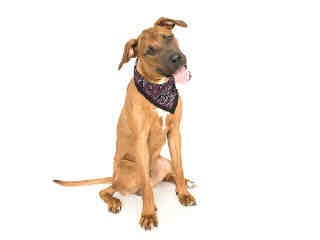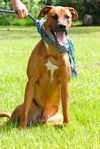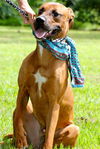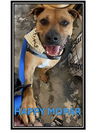
| My Rescue |
| Login to Remember your Favorite Animals and Breeds! |
Won't you consider helping him get a new start?
Learn more about the Boxer.
Winston has survied a lot! Here is his story:
My name is Eric. One day two weeks ago I was walking over to my soccer game and I found a sweet, big puppy tied to a post and dehydrated. I gave it some water, then I actually ran home to get him some dog food. Numerous kids at the fields, adults, etc etc ended up taking a liking to this dog as it was sweet as can be and playful as well, all the while being a big baby. I decided I would take it home for a night and then try to bring it to you. I have 3 dogs and just can't afford to rescue anymore. Obviously, I wish I could every dog, but this one is special. One of the park rangers there said he would take care of it and find a way to do so. That made me happy, but something told me that didn't happen. So I went to a shelter near the Millenia mall and there was the dog. He is so nice, loving, caring, etc etc.....I was really hoping I could get him to you and use your services to find him a home. I'm really praying that you will take this amazing dog who has had a bad life thus far, and give him a better chance at life. Please let me know asap if this can happen. His name at the pound is now "Winston".
Well after hearing this story we just had to take Winston. He is now safely living at our shelter looking for his forever home. He really is a big puppy and needs some basic training but is all loves and kisses!
According to www.dogbreedinfo.com, the Rhodesian Ridgeback, originally from Zimbabwe, resulted from crosses between ridgebacked dogs originally kept by native tribes in South Africa and other breeds, such as the Khoikhoi dog, Mastiff, Deerhound and some breeds that are not known. It was the native Khoikhoi dog that gave the Ridgeback his distinctive reverse-hair coat marking, a dominant characteristic that today makes him unique among dog breeds. The ridgebacks were imported by Boer settlers in the 16th and 17th centuries. Its standard, fixed in Rhodesia, dates from 1922. The Rhodesian Ridgeback was used for many purposes. This impressive, protective hound could hunt game, retrieve, take care of children, and guard property. South African hunters discovered that the Ridgeback, used in packs, was very effective against lions, hence the breed's other name, the African Lion Hound. The Rhodesian Ridgeback is well adapted to the harsh African environment. He can withstand very high temperatures and the damp cold of night. It is insensitive to insect bites and can go without food and water for over 24 hours. The Rhodesian Ridgeback is ferocious in the hunt, but in the home it is a calm, gentle, obedient, good dog. Good-natured, but some do not do well with children because they do not want to be pestered or played with roughly. They are intelligent, cunning but straight-forward dogs that are loyal to the family, have something of a mind of their own, are brave, vigilant, reserved toward strangers, and possess considerable stamina. This breed needs thorough obedience training, socialization with people and other dogs, and firm owner leadership to become the excellent companion he can be. Ridgebacks react best to an extremely consistent and equable approach to training. They are intelligent and learn quickly, but they are also strong and a bit stubborn. Training should be gentle and start young while the dog is still small enough to manage. They are also very good watch dogs, but not suggested for guard dogs. They are very protective of owners! This has to be addressed during their early training. This breed can be more destructive than a Lab if left unsupervised! Do not overfeed this breed. Males may be combative with other dogs. Provided this dog meets cats and other pets when it is young, any potential problem will be prevented. Ridgebacks make excellent jogging companions. They have a life expectancy of about 10-12 years.
Other Pictures of Winston the Ridgeback Mix (click to see larger version):
 70.2k |
 23.1k |
 23.8k |
 61.8k |
 11.9k |
Copyright © Pet Rescue by Judy





